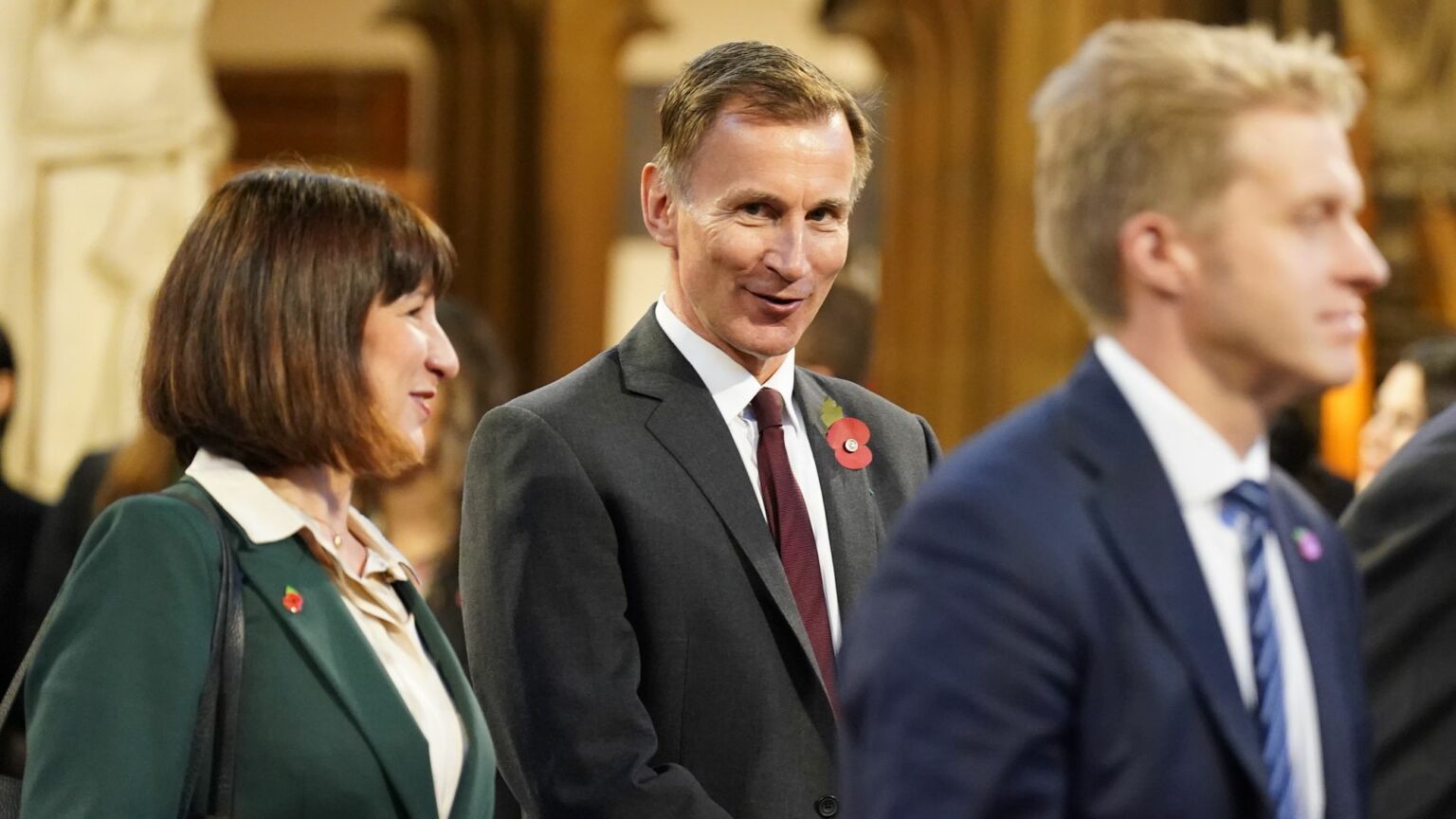The tyranny of government-by-spreadsheet
Both Jeremy Hunt and Rachel Reeves want to insulate economic policy from democracy.

The budget isn’t what it used to be. Not that long ago, a UK chancellor’s budget statement was one of the big set-piece parliamentary events of the year. It felt like it genuinely mattered.
In the run-up, its contents would be shrouded in secrecy. The chancellor and other cabinet ministers would refrain from even hinting at its contents – a practice known as budget purdah. On the day itself, the chancellor would show off the famous red budget box on the steps of No11 Downing Street. Then, having made his way to a packed House of Commons, he would read out the eagerly awaited budget statement. This was the only date on the parliamentary calendar that a minister could consume alcohol at the despatch box.
Today, many of these customs have long since fallen away. Chancellors now happily leak the details of the budget days in advance. They’ve stopped using William Gladstone’s well-battered 19th-century scarlet box. And the right to booze has literally been watered down. Whisky drinker Ken Clarke, chancellor between 1993 and 1997, is thought to be the last to have imbibed anything stronger than mineral water.
The demise of these traditions might not seem all that significant at first glance. But it actually captures something substantial. It speaks to the hollowing out of the budget’s political function and importance.
After all, the budget used to be the government’s main opportunity to unveil its political programme and allot society’s resources accordingly. It was an annual moment of huge political significance. Yet, from the late 1980s onwards, it has become an increasingly managerial exercise, drained of any broader political vision. Today’s budgets represent a triumph of technocracy over democratic politics.
Chancellor Jeremy Hunt unwittingly showed just how politically hollow the budget has now become in a recent BBC Radio 4 interview with Nick Robinson. Robinson asked Hunt if preparing the budget still involved writing every policy idea with its cost on a card, and then moving the cards around a table to decide the priorities. He was asking, in effect, if the budget still involved political decision-making.
But Hunt missed the point of the question. He responded by saying that the process is more ‘high-tech’ now. Tellingly, he said it is driven by the ‘weirdest spreadsheet you will ever see’. And he reminded listeners that the budget is prepared alongside the forecasts of the Office for Budget Responsibility (OBR) – a quango that ensures the government is keeping the annual deficit and accumulated public debt below prescribed levels. Hunt made the budget sound like an almost automated process.
This shows that the budget is no longer seen, even by our own chancellor, as a chance to act on a set of political priorities. It has degenerated into managing a spreadsheet under the supervision of an ‘independent’ fiscal watchdog. It is no longer about actualising a government’s vision for a better society. It’s a technocratic exercise in data management.
There is nothing wrong with governments setting fiscal objectives, such as reducing public debt or not borrowing to fund day-to-day operational spending. Spending responsibly is obviously better than spending recklessly. The problem here is that our elected representatives are no longer the ones deciding what counts as responsible spending, or how much tax should be collected. So much of the process of drawing up the budget has instead been outsourced to rules-obsessed technocrats.
The way politicians and the media talk about ‘fiscal rules’ or the authority of the OBR, you’d think these supposedly hallowed institutions had been around for centuries. In fact, they are all less than 30 years old. New Labour chancellor Gordon Brown was the first to openly subordinate his budgets to fiscal rules in 1997. It’s worth noting that we are currently on the ninth set of fiscal rules, which shows they are hardly sacrosanct. The OBR is of even more recent vintage. Conservative chancellor George Osborne established it in 2010.
Today, this technocratic fiscal regime is supported by the entire political class. Indeed, Labour is as committed as the Tories are to tight spending limits and getting the approval of the OBR. Labour leader Keir Starmer and shadow chancellor Rachel Reeves are so fearful of being accused of fiscal irresponsibility that they have pledged to match existing tax rates. And they have just this month dropped Labour’s flagship spending pledge – the £28-billion-a-year ‘green prosperity plan’. ‘The fiscal rules come first’, Starmer said last week, as he scrapped the policy.
Reeves has even suggested that her spending rules could be tighter than the Tories’. She has pledged that a Labour government ‘will not borrow to fund day-to-day spending’ and ‘will reduce national debt as a share of the economy’. She has also promised a new Charter for Budget Responsibility, incorporating a ‘fiscal lock’ that would legally force the government to prostrate itself before the OBR.
Any hint of deviation from the fiscal rules is met with a stern response from the technocratic establishment. Take Jeremy Hunt’s muted talk of cutting taxes and his support for ‘low-tax economies’ last month. This provoked dismay from assorted technocratic bodies. The OBR itself, the Institute for Fiscal Studies and, most recently, the International Monetary Fund have all warned Hunt against lowering taxes. Richard Hughes, the head of the OBR, was positively disdainful of Hunt’s comments. He told the House of Lords Economic Affairs Committee in January that the government’s spending plans beyond next year were ‘worse than fiction’. Any democratically elected government worth its salt would tell these unelected bodies to butt out of political affairs. But instead, in the face of criticism, Hunt backtracked earlier this month, claiming that there is now very little scope for cutting taxes.
The political and media classes’ obsession with fiscal rules and balancing the spreadsheets is terrible for democratic debate. It means citizens are reduced to mere spectators. It turns policymaking into a rule-bound, data-driven process over which the public has no say or control.
We need to start re-politicising and re-democratising public life. This means having a thoughtful and meaningful political debate over the economy and how the government should allocate society’s resources. A debate on the political goals of public spending. A debate on how we can revitalise the UK economy and how best to deliver the public services people deserve. The budget ought to be a chance to spark that debate. A chance to talk about where the public good might lie. Instead, all we have is an arid discussion about whether the latest tax proposal will meet the fiscal rules.
We need to break free from the technocrats’ rulebook.
Phil Mullan’s Beyond Confrontation: Globalists, Nationalists and Their Discontents is published by Emerald Publishing. Order it from Emerald or Amazon (UK).
Picture by: Getty.
To enquire about republishing spiked’s content, a right to reply or to request a correction, please contact the managing editor, Viv Regan.









Comments
Want to join the conversation?
Only spiked supporters and patrons, who donate regularly to us, can comment on our articles.